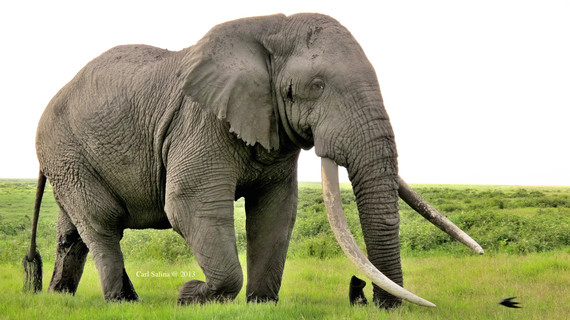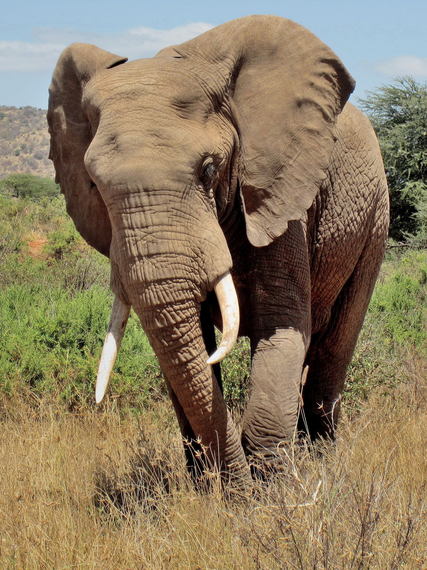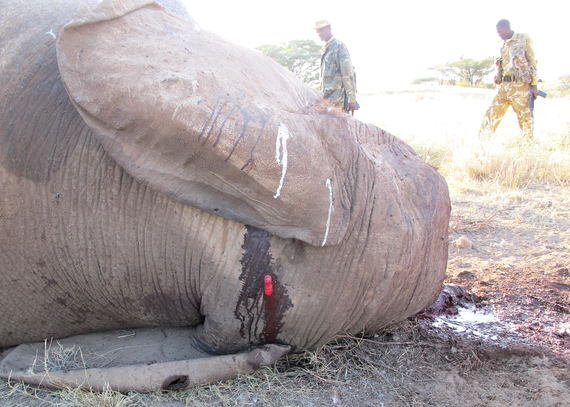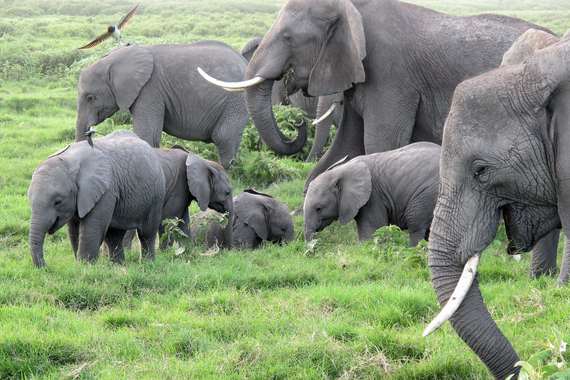Everyone, it seems, loves elephants. A new film titled Illicit Ivory premiered last week on KCET in Southern California and elsewhere. You can watch it online at KCET.org/ivory. The trailer is at LinkTV.org/ivory.
It's an upsetting film. The good news? There is a groundswell of effort that is beginning to work to slow the ivory trade. It can be done; we can save the elephants. The more we understand, the faster each of us can help it happen.
So why watch a tough film? Must we subject ourselves to the knowledge that every 20 minutes, an elephant is killed for its tusks? How does it help us -- indeed how does it help elephants -- for us to know that the slaughter is driven by ignorance, greed, and an insatiable demand for ivory? Why see such disturbing images?
I interviewed the film's producer Raisa Scriabine, to ask her some hard questions: how does it help for people who love elephants and would never buy ivory to watch an unpleasant and disturbing film about an issue that is perhaps the world's worst animal nightmare? Here is our conversation.
CS: What are the most important facts in this program?
Raisa Scriabine: Wildlife crime is the 4th largest transnational criminal activity - next to trafficking guns, drugs and people. Illicit ivory, a burgeoning and highly lucrative business bringing in about a billion dollars a year, is a large part of it. Some of the world's worst and most dangerous actors are involved. Raking in the biggest profits are Asian criminal syndicates. The illicit ivory trade puts guns and ammunition into the hands of terrorists like Somalia's Al Shabab; insurgents like Uganda's Joseph Kony who is wanted for crimes against humanity, and militias like the Janjaweed, affiliated with the government of Sudan and behind the genocide in Darfur. Illicit ivory destabilizes and militarizes already fragile and failing states in Africa - in a region where Islamic militancy is rapidly growing. It is an issue of national and global security.
CS: What do you want people to come away with?
Raisa Scriabine: Elephants have been on this planet for two million years - far longer than modern humans who have inhabited Earth for only 200,000 years. They have known no predators except man. Now because of man, they are on the brink of extinction. Elephants may be gone in as little as ten years. Our generation will have killed them off. Is this the legacy we really want to leave to our children?

CS: Why are elephants important?
Raisa Scriabine: From Disney's Dumbo to Jean de Brunhoff's Barbar, elephants have a special place in our hearts. What child doesn't yearn to see elephants? But they are more than just part of our cultural heritage. Elephants are a keystone species. This means that they are ecologically vital to the survival of many other species. Many trees only germinate if they pass through an elephant's digestive tract. Elephants make gaps and pathways through rainforests, which helps a wide variety of plant species to grow. They have a vital niche in the ecological system.
CS: The vast majority of us live without elephants and without ivory. Who should care--and why?
Raisa Scriabine: Everyone should care whether they live in the proximity of elephants or not. Local communities benefit economically from wildlife tourism in parks and protected areas.
The potential loss of these magnificent animals, the largest land mammals on Earth, is ultimately a moral issue. We have an obligation to value and protect the Earth's natural heritage. We can easily do without ivory, which is largely a status symbol - but one that has caused undo suffering for both elephants and man over the centuries.
Elephants and humans have a lot in common. Our brains are similar in structure. Elephants are intelligent, feel joy, grief and even have a sense of humor. It may also be quite true that they never forget. The fact that the global community is working feverishly to save the last of Africa's elephants, is a testament to the fact that people not only should care but indeed do care. 
Philo was in his teens when this photo was taken. Four days later, poachers killed him. Photo: Ike Leonard
CS: What can Americans and Europeans do? Ivory import is already banned. Are we powerless?
Raisa Scriabine: There are many loopholes in laws that allow the current illicit ivory trade to proliferate. It is important to plug them up at state, national and international levels. Demanding tighter restrictions on ivory sale is a way for people to make a difference. Educational and public awareness efforts to help people understand that when they buy an ivory trinket an elephant actually has to die; this can also help bring about change. When consumer demand dries up, it will make ivory a less lucrative business for organized criminals, insurgents and terrorists.
CS: Do you have hope? If so explain in some detail.
Raisa Scriabine: Without it there is no reason for action. Saving Africa's elephants is more than a conservation issue but an issue of global security, economic development and adherence to the rule of law. For this reason, a diverse and large constituency is working to save elephants. It includes enforcement organizations, groups specializing in organized crime and terrorism, hundreds of governmental and non-governmental organizations, private companies as well as prominent individuals from the worlds of sports and entertainment. The White House has taken steps to address illegal wildlife trade. The Clinton Global Initiative has been vocal and active on this issue. The Duke Of Cambridge has taken up the cause.
CS: Can they succeed; can we?
Raisa Scriabine: Saving the elephants is a daunting task. It requires good will to be translated into concrete action. Consumers in key countries like China, the U.S. and the nations of the European Union need to actually stop buying ivory. Elephant slaughter in Africa's parks and protected areas has to stop. That means dealing with heavily armed militias, insurgents and even state security forces that poach for profit. Tighter laws that ban ivory are needed. Better enforcement and political will are required but difficult to achieve. A rampant culture of corruption permeates every aspect of illicit ivory trade. Cutting into the ivory profits of transnational organized crime syndicates may well encourage them to look elsewhere for a buck. It's a lot to get done in less than ten years. And the clock is ticking.
CS: There is another thing we can do. The groups at the front lines need money. Some of my favorite groups standing between elephants and poachers, and helping change demand by educating consumers in China and elsewhere, include the following:
WildAid
International Fund for Animal Welfare
Save the Elephants
Big Life Foundation
Amboseli Trust for Elephants
David Sheldrick Wildlife Trust
They do the hard work, at personal risk, and don't avert their gaze. Give them your support.

